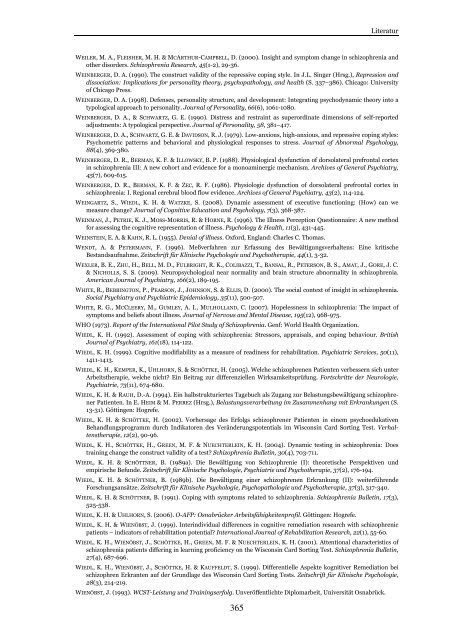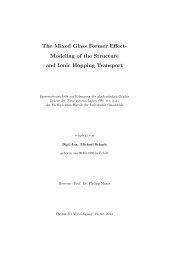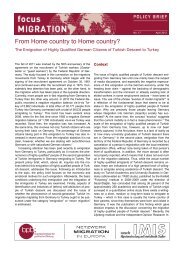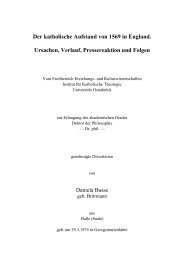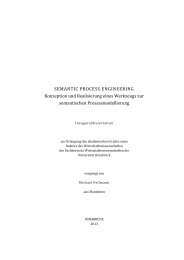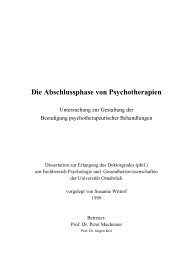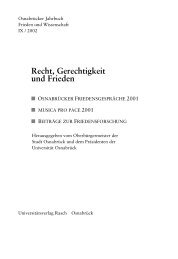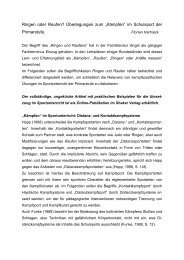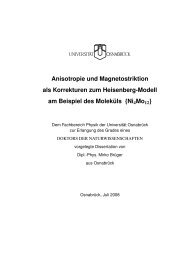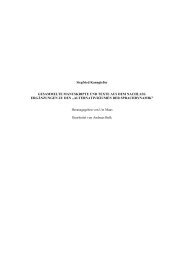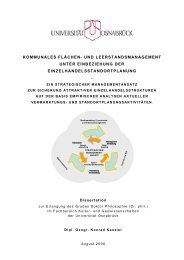364 Literatur neurobehavioral findings to psychosocial approaches. Keio University International Symposia for Life Sciences and Medicine (Vol. 8). Tokio: Springer. VENTURA, J., NUECHTERLEIN, K. H., SUBOTNIK, K. L., GREEN, M. F. & GITLIN, M. J. (2004). Self-efficacy and neurocognition may be related to coping responses in recent-onset schizophrenia. Schizophrenia Research, 69(2-3), 343-352. VERDOUX, H., MAGNIN, E. & BOURGEOIS, M. (1995). Neuroleptic effects on neuropsychological test performance in schizophrenia. Schizophrenia Research, 14(2), 133-139. VERMA, R. M. (1979). Dissimulation function in some functional psychoses. Acta Psychiatrica Scandinavica, 60(1), 29- 38. VOGELEY, K., KURTHEN, M., FALKAI, P. & MAIER, W. (1999). Essential functions of the human self model are implemented in the prefrontal cortex. Consciousness and Cognition, 8(3), 343-363. VOLLEMA, M. G., GEURTSEN, G. J. & VAN VOORST, A. J. P. (1995). Durable improvements in Wisconsin Card Sorting Test performance in schizophrenic patients. Schizophrenia Research, 16(3), 209-215. VORUGANTI, L. N. P., HESLEGRAVE, R. J. & AWAD, A. G. (1997). Neurocognitive correlates of positive and negative syndromes in schizophrenia. Canadian Journal of Psychiatry, 42(10), 1066-1071. VRACOTAS, N., SCHMITZ, N., JOOBER, R. & MALLA, A. (2007). Subjective distress in first-episode psychosis: Role of symptoms and self-esteem. Early Intervention in Psychiatry, 1(3), 251-258. WAGER, T. D. & SMITH, E. E. (2003). Neuroimaging studies of working memory: A meta-analysis. Cognitive, Affective & Behavioral Neuroscience, 3(4), 255-274. WALDORF, M. (2005). Neurokognition, Lernpotential <strong>und</strong> subjektive Aufmerksamkeitsdefizite bei Schizophrenie. Unveröffentlichte Diplomarbeit, Universität Osnabrück. WALDORF, M., WEINGARTZ, S. & WATZKE, S. (2010, April). Welche Veränderungsmaße des Dynamischen Wisconsin Card Sorting Test eignen sich für die Vorhersage von Behandlungserfolg? Ein Methodenvergleich. Vortrag, gehalten auf dem VIII. Internationalen Schizophrenie-Symposium Bern (ISSB). WALDORF, M., WIEDL, K. H. & SCHÖTTKE, H. (2007, Mai). Verlaufsformen, Korrelate <strong>und</strong> Prädiktion der Einsicht von Rehabilitanden mit Schizophrenie. Poster präsentiert auf dem 25. Symposium der Fachgruppe Klinische Psychologie <strong>und</strong> Psychotherapie der Deutschen Gesellschaft für Psychologie (DGPs), Tübingen. WALKER, E., KESTLER, L., BOLLINI, A. & HOCHMAN, K. M. (2004). Schizophrenia: Etiology and course. Annual Review of Psychology, 55, 401-430. WALKER, E., MITTAL, V. & TESSNER, K. (2008). Stress and the hypothalamic pituitary adrenal axis in the developmental course of schizophrenia. Annual Review of Clinical Psychology, 4, 189-216. WALLACE, C. J., LIBERMAN, R. P., MACKAIN, S. J., BLACKWELL, G. & ECKMAN, T. A. (1992). Effectiveness and replicability of modules for teaching social and instrumental skills to the severely mentally ill. American Journal of Psychiatry, 149(5), 654-658. WALLSTON, K. A., WALLSTON, B. S. & DEVELLIS, R. (1978). Development of the Multidimensional Health Locus of Control (MHLC) scales. Health Education Monographs, 6(2), 160-170. WAMPOLD, B. E. & JENSON, W. R. (1986). Clinical significance revisited. Behavior Therapy, 17, 302-305. WAR DEPARTMENT, ADJUTANT GENERAL’S OFFICE (1944). The Army Individual Test manual. Washington, DC: US War Department. WARMAN, D. M. & MARTIN, J. M. (2006). Cognitive insight and delusion proness: An investigation using the Beck Cognitive Insight Scale. Schizophrenia Research, 84(2-3), 297-304. WARMAN, D. M., LYSAKER, P. H. & MARTIN, J. M. (2007). Cognitive insight and psychotic disorder: The impact of active delusions. Schizophrenia Research, 90(1-3), 325-333. WARNER, R., TAYLOR, D., POWERS, M. & HYMAN, J. (1989). Acceptance of the mental illness label by psychotic patients: Effects on functioning. American Journal of Orthopsychiatry, 59(3), 398-409. WATSON, A. C., CORRIGAN, P., LARSON, J. E. & SELLS, M. (2007). Self-stigma in people with mental illness. Schizophrenia Bulletin, 33(6), 1312-1318. WATSON, P. W. B., GARETY, P. A.; WEINMAN, J., DUNN, G., BEBBINGTON, P. E., FOWLER, D., FREEMAN, D. & KUIPERS, E. (2006). Emotional dysfunction in schizophrenia spectrum psychosis: The role of illness perceptions. Psychological Medicine, 36(6), 761-770. WATSON, D. & HUBBARD, B. (1996). Adaptational style and dispositional structure: Coping in the context of the five-factor model. Journal of Personality, 64(4), 737-774. WATZKE, S., BRIEGER, P., KUSS, O., SCHÖTTKE, H. & WIEDL, K. H. (2008). A longitudinal study of learning potential and rehabilitation outcome in schizophrenia. Psychiatric Services, 59(3), 248-255. WECHSLER, D. (1981). Wechsler Adult Intelligence Scale-Revised. Manual. New York: The Psychological Corporation. WECHSLER, D. (1987). Wechsler Memory Scale-Revised. Manual. San Antonio, USA: The Psychological Corporation. WEICKERT, T. W., GOLDBERG, T. E., GOLD, J. M., BIGELOW, L. B., EGAN, M. F. & WEINBERGER, D. R. (2000). Cognitive impairments in patients with schizophrenia displaying preserved and compromised intellect. Archives of General Psychiatry, 57(9), 907-913. WEIGL, E. (1927). Zur Psychologie sogenannter Abstraktionsprozesse. I. Untersuchungen über das 'Ordnen'. Zeitschrift für Psychologie, 103, 1-45.
365 Literatur WEILER, M. A., FLEISHER, M. H. & MCARTHUR-CAMPBELL, D. (2000). Insight and symptom change in schizophrenia and other disorders. Schizophrenia Research, 45(1-2), 29-36. WEINBERGER, D. A. (1990). The construct validity of the repressive coping style. In J.L. Singer (Hrsg.), Repression and dissociation: Implications for personality theory, psychopathology, and health (S. 337–386). Chicago: University of Chicago Press. WEINBERGER, D. A. (1998). Defenses, personality structure, and development: Integrating psychodynamic theory into a typological approach to personality. Journal of Personality, 66(6), 1061-1080. WEINBERGER, D. A., & SCHWARTZ, G. E. (1990). Distress and restraint as superordinate dimensions of self-reported adjustments: A typological perspective. Journal of Personality, 58, 381–417. WEINBERGER, D. A., SCHWARTZ, G. E. & DAVIDSON, R. J. (1979). Low-anxious, high-anxious, and repressive coping styles: Psychometric patterns and behavioral and physiological responses to stress. Journal of Abnormal Psychology, 88(4), 369-380. WEINBERGER, D. R., BERMAN, K. F. & ILLOWSKY, B. P. (1988). Physiological dysfunction of dorsolateral prefrontal cortex in schizophrenia III: A new cohort and evidence for a monoaminergic mechanism. Archives of General Psychiatry, 45(7), 609-615. WEINBERGER, D. R., BERMAN, K. F. & ZEC, R. F. (1986). Physiologic dysfunction of dorsolateral prefrontal cortex in schizophrenia: I. Regional cerebral blood flow evidence. Archives of General Psychiatry, 43(2), 114-124. WEINGARTZ, S., WIEDL, K. H. & WATZKE, S. (2008). Dynamic assessment of executive functioning: (How) can we measure change? Journal of Cognitive Education and Psychology, 7(3), 368-387. WEINMAN, J., PETRIE, K. J., MOSS-MORRIS, R. & HORNE, R. (1996). The Illness Perception Questionnaire: A new method for assessing the cognitive representation of illness. Psychology & Health, 11(3), 431-445. WEINSTEIN, E. A. & KAHN, R. L. (1955). Denial of illness. Oxford, England: Charles C. Thomas. WENDT, A. & PETERMANN, F. (1996). Meßverfahren zur Erfassung des Bewältigungsverhaltens: Eine kritische Bestandsaufnahme. Zeitschrift für Klinische Psychologie <strong>und</strong> Psychotherapie, 44(1), 3-32. WEXLER, B. E., ZHU, H., BELL, M. D., FULBRIGHT, R. K., COLIBAZZI, T., BANSAL, R., PETERSON, B. S., AMAT, J., GORE, J. C. & NICHOLLS, S. S. (2009). Neuropsychological near normality and brain structure abnormality in schizophrenia. American Journal of Psychiatry, 166(2), 189-195. WHITE, R., BEBBINGTON, P., PEARSON, J., JOHNSON, S. & ELLIS, D. (2000). The social context of insight in schizophrenia. Social Psychiatry and Psychiatric Epidemiology, 35(11), 500-507. WHITE, R. G., MCCLEERY, M., GUMLEY, A. I., MULHOLLAND, C. (2007). Hopelessness in schizophrenia: The impact of symptoms and beliefs about illness. Journal of Nervous and Mental Disease, 195(12), 968-975. WHO (1973). Report of the International Pilot Study of Schizophrenia. Genf: World Health Organization. WIEDL, K. H. (1992). Assessment of coping with schizophrenia: Stressors, appraisals, and coping behaviour. British Journal of Psychiatry, 161(18), 114-122. WIEDL, K. H. (1999). Cognitive modifiability as a measure of readiness for rehabilitation. Psychiatric Services, 50(11), 1411-1413. WIEDL, K. H., KEMPER, K., UHLHORN, S. & SCHÖTTKE, H. (2005). Welche schizophrenen Patienten verbessern sich unter Arbeitstherapie, welche nicht? Ein Beitrag zur differenziellen Wirksamkeitsprüfung. Fortschritte der Neurologie, Psychiatrie, 73(11), 674-680. WIEDL, K. H. & RAUH, D.-A. (1994). Ein halbstrukturiertes Tagebuch als Zugang zur Belastungsbewältigung schizophrener Patienten. In E. HEIM & M. PERREZ (Hrsg.), Belastungsverarbeitung im Zusammenhang mit Erkrankungen (S. 13-31). Göttingen: Hogrefe. WIEDL, K. H. & SCHÖTTKE, H. (2002). Vorhersage des Erfolgs schizophrener Patienten in einem psychoedukativen Behandlungsprogramm durch Indikatoren des Veränderungspotentials im Wisconsin Card Sorting Test. Verhaltenstherapie, 12(2), 90-96. WIEDL, K. H., SCHÖTTKE, H., GREEN, M. F. & NUECHTERLEIN, K. H. (2004). Dynamic testing in schizophrenia: Does training change the construct validity of a test? Schizophrenia Bulletin, 30(4), 703-711. WIEDL, K. H. & SCHÖTTNER, B. (1989a). Die Bewältigung von Schizophrenie (I): theoretische Perspektiven <strong>und</strong> empirische Bef<strong>und</strong>e. Zeitschrift für Klinische Psychologie, Psychiatrie <strong>und</strong> Psychotherapie, 37(2), 176-194. WIEDL, K. H. & SCHÖTTNER, B. (1989b). Die Bewältigung einer schizophrenen Erkrankung (II): weiterführende Forschungsansätze. Zeitschrift für Klinische Psychologie, Psychopathologie <strong>und</strong> Psychotherapie, 37(3), 317-340. WIEDL, K. H. & SCHÖTTNER, B. (1991). Coping with symptoms related to schizophrenia. Schizophrenia Bulletin, 17(3), 525-538. WIEDL, K. H. & UHLHORN, S. (2006). O-AFP: Osnabrücker Arbeitsfähigkeitenprofil. Göttingen: Hogrefe. WIEDL, K. H. & WIENÖBST, J. (1999). Interindividual differences in cognitive remediation research with schizophrenic patients – indicators of rehabilitation potential? International Journal of Rehabilitation Research, 22(1), 55-60. WIEDL, K. H., WIENÖBST, J., SCHÖTTKE, H., GREEN, M. F. & NUECHTERLEIN, K. H. (2001). Attentional characteristics of schizophrenia patients differing in learning proficiency on the Wisconsin Card Sorting Test. Schizophrenia Bulletin, 27(4), 687-696. WIEDL, K. H., WIENÖBST, J., SCHÖTTKE, H. & KAUFFELDT, S. (1999). Differentielle Aspekte kognitiver Remediation bei schizophren Erkranten auf der Gr<strong>und</strong>lage des Wisconsin Card Sorting Tests. Zeitschrift für Klinische Psychologie, 28(3), 214-219. WIENÖBST, J. (1993). WCST-Leistung <strong>und</strong> Trainingserfolg. Unveröffentlichte Diplomarbeit, Universität Osnabrück.
- Seite 1 und 2:
Krankheitseinsicht, dynamisch getes
- Seite 3 und 4:
Danksagung iii Einleitung Es wird Z
- Seite 5 und 6:
v Einleitung 5.2.3.5 Prozessorienti
- Seite 7 und 8:
vii Einleitung 12.1.3 Ergebnisse St
- Seite 9 und 10:
ix Einleitung Tabelle 45. Hauptkomp
- Seite 11 und 12:
Tabelle 1. Verzeichnis der wichtigs
- Seite 13 und 14:
Abstract xiii Einleitung Objective:
- Seite 15 und 16:
15 Einleitung Angesichts der Belieb
- Seite 17 und 18:
17 Einleitung Bewältigungsmodell v
- Seite 19 und 20:
19 Wisconsin Card Sorting Test 2001
- Seite 21 und 22:
21 Wisconsin Card Sorting Test Effe
- Seite 23 und 24:
23 Wisconsin Card Sorting Test Das
- Seite 25 und 26:
Tabelle 2. Exekutive und Arbeitsged
- Seite 27 und 28:
3.3 Durchführung und Kennwerte des
- Seite 29 und 30:
3.4 WCST-Defizite bei Schizophrenie
- Seite 31 und 32:
Tabelle 5. Konzeptuelles Schema zur
- Seite 33 und 34:
3.5.1 Attributidentifikation / Abst
- Seite 35 und 36:
35 Wisconsin Card Sorting Test oder
- Seite 37 und 38:
37 Wisconsin Card Sorting Test elem
- Seite 39 und 40:
39 Wisconsin Card Sorting Test ein
- Seite 41 und 42:
41 Wisconsin Card Sorting Test Fehl
- Seite 43 und 44:
43 Wisconsin Card Sorting Test zus
- Seite 45 und 46:
45 Wisconsin Card Sorting Test Lern
- Seite 47 und 48:
3.5.5 Orientierungsvariablen 47 Wis
- Seite 49 und 50:
49 Wisconsin Card Sorting Test zehn
- Seite 51 und 52:
51 Wisconsin Card Sorting Test Fehl
- Seite 53 und 54:
53 Wisconsin Card Sorting Test mit
- Seite 55 und 56:
55 Wisconsin Card Sorting Test PAOL
- Seite 57 und 58:
Tabelle 6. Übersicht über Studien
- Seite 59 und 60:
3.7.3 Faktorstruktur des WCST 59 Wi
- Seite 61 und 62:
Tabelle 7 (Fortsetzung). (o) (p) (q
- Seite 63 und 64:
3.8.2 Bildung 63 Wisconsin Card Sor
- Seite 65 und 66:
3.9 Der Dynamische WCST in der Schi
- Seite 67 und 68:
67 Wisconsin Card Sorting Test darg
- Seite 69 und 70:
69 Wisconsin Card Sorting Test WIED
- Seite 71 und 72:
71 Wisconsin Card Sorting Test Durc
- Seite 73 und 74:
73 Wisconsin Card Sorting Test 3.9.
- Seite 75 und 76:
75 Wisconsin Card Sorting Test WALL
- Seite 77 und 78:
4. Statistische Modelle der Veränd
- Seite 79 und 80:
79 Reliable Change Index mittleren
- Seite 81 und 82:
81 Reliable Change Index (b) x2 sol
- Seite 83 und 84:
83 Reliable Change Index (3.) regre
- Seite 85 und 86:
85 Reliable Change Index Bei einem
- Seite 87 und 88:
87 Reliable Change Index statistisc
- Seite 89 und 90:
89 Reliable Change Index der Differ
- Seite 91 und 92:
91 Reliable Change Index Patienten
- Seite 93 und 94:
93 Reliable Change Index Tabelle 8.
- Seite 95 und 96:
95 Reliable Change Index WIEDL, WIE
- Seite 97 und 98:
97 Coping und Abwehr (3.) die oftma
- Seite 99 und 100:
Darstellung der wichtigsten tiefenp
- Seite 101 und 102:
101 Coping und Abwehr unterschiedli
- Seite 103 und 104:
103 Coping und Abwehr von Bewältig
- Seite 105 und 106:
105 Coping und Abwehr bedrohliche K
- Seite 107 und 108:
107 Coping und Abwehr das Problem d
- Seite 109 und 110:
5.2.3.6 Antezedenzien von Bewertung
- Seite 111 und 112:
6. Krankheitseinsicht von Menschen
- Seite 113 und 114:
113 Krankheitseinsicht die Bedeutun
- Seite 115 und 116:
115 Krankheitseinsicht Kombination
- Seite 117 und 118:
117 Krankheitseinsicht negative Bew
- Seite 119 und 120:
119 Krankheitseinsicht Während die
- Seite 121 und 122:
121 Krankheitseinsicht WARNER, TAYL
- Seite 123 und 124:
123 Krankheitseinsicht Symptomatik
- Seite 125 und 126:
125 Krankheitseinsicht (z. B. aus d
- Seite 127 und 128:
127 Krankheitseinsicht Diesem Zweck
- Seite 129 und 130:
6.5.2 Krankheitseinsicht: Begriffsk
- Seite 131 und 132:
131 Krankheitseinsicht Der erste be
- Seite 133 und 134:
Tabelle 11. Konfigurationen von Ein
- Seite 135 und 136:
6.5.4.1 Einsichts-Interviews 135 Kr
- Seite 137 und 138:
137 Krankheitseinsicht having sympt
- Seite 139 und 140:
139 Krankheitseinsicht Self-Apprais
- Seite 141 und 142:
141 Krankheitseinsicht chronifizier
- Seite 143 und 144:
143 Krankheitseinsicht have a menta
- Seite 145 und 146:
145 Krankheitseinsicht veröffentli
- Seite 147 und 148:
147 Krankheitseinsicht werden als r
- Seite 149 und 150:
149 Krankheitseinsicht Wichtig wär
- Seite 151 und 152:
151 Krankheitseinsicht Die Befundla
- Seite 153 und 154:
Pfad b Interaktionale Konstruktion
- Seite 155 und 156:
155 Krankheitseinsicht Validierung
- Seite 157 und 158:
6.5.12 Die nosologische Hypothese:
- Seite 159 und 160:
159 Krankheitseinsicht Die Möglich
- Seite 161 und 162:
161 Krankheitseinsicht Exekutivfunk
- Seite 163 und 164:
163 Krankheitseinsicht (z. B. HILL,
- Seite 165 und 166:
165 Krankheitseinsicht Einige Autor
- Seite 167 und 168:
167 Krankheitseinsicht Fehlattribut
- Seite 169 und 170:
6.5.14 Motivationale Hypothesen: Ab
- Seite 171 und 172:
171 Krankheitseinsicht Das RS-Konze
- Seite 173 und 174:
173 Krankheitseinsicht problemzentr
- Seite 175 und 176:
175 Krankheitseinsicht ursprünglic
- Seite 177 und 178:
177 Krankheitseinsicht reduzierter
- Seite 179 und 180:
179 Krankheitseinsicht äußerst kn
- Seite 181 und 182:
Prämorbide Intelligenz Psychose- E
- Seite 183 und 184:
183 Krankheitseinsicht personen, al
- Seite 185 und 186:
6.5.16 Multifaktorielle Einsichts-M
- Seite 187 und 188:
187 Krankheitseinsicht Erkrankungsb
- Seite 189 und 190:
7. Fragestellungen und Hypothesen 1
- Seite 191 und 192:
Hypothese 2.4: Validierung anhand d
- Seite 193 und 194:
Hypothese 3.3: Einsicht und Exekuti
- Seite 195 und 196:
8. Methoden 8.1 Beschreibung der In
- Seite 197 und 198:
197 Methoden Select-by-marker-Analy
- Seite 199 und 200:
199 Methoden eine weitere, eher all
- Seite 201 und 202:
201 Methoden Obwohl ursprünglich l
- Seite 203 und 204:
203 Methoden Tabelle 15 stellt den
- Seite 205 und 206:
205 Ergebnisse Studie 1 Hälfte auc
- Seite 207 und 208:
207 Ergebnisse Studie 1 Tabelle 18.
- Seite 209 und 210:
9.4 Hauptkomponentenanalyse des WCS
- Seite 211 und 212:
10. Ergebnisse Studie 2: 211 Ergebn
- Seite 213 und 214:
213 Ergebnisse Studie 2 postakuten
- Seite 215 und 216:
215 Ergebnisse Studie 2 entspricht
- Seite 217 und 218:
217 Ergebnisse Studie 2 Verteilung
- Seite 219 und 220:
Tabelle 24. Übersicht über berech
- Seite 221 und 222:
Tabelle 26. Zehn WCST-Performanztyp
- Seite 223 und 224:
223 Ergebnisse Studie 2 Zusammenhan
- Seite 225 und 226:
10.6 Unterschiedstests und Konkorda
- Seite 227 und 228:
227 Ergebnisse Studie 2 nach LANDIS
- Seite 229 und 230:
229 Ergebnisse Studie 2 zur Decke,
- Seite 231 und 232:
10.8 Komposition von Metatypen 231
- Seite 233 und 234:
Tabelle 35. Cluster-Varianzen und F
- Seite 235 und 236:
10.8.2 Übereinstimmung von RCI-Typ
- Seite 237 und 238:
Tabelle 39. Kreuztabelle WCSTdyn-Cl
- Seite 239 und 240:
239 Ergebnisse Studie 2 Die dargest
- Seite 241 und 242:
Tabelle 42. Korrekte Sortierungen i
- Seite 243 und 244:
10.9 Soziodemographische und klinis
- Seite 245 und 246:
Tabelle 45. Rotierte Komponentenmat
- Seite 247 und 248:
10.10 Externe Validierung der Metat
- Seite 249 und 250:
249 Ergebnisse Studie 2 Es besteht
- Seite 251 und 252:
Tabelle 51. Lernverläufe der AVLT-
- Seite 253 und 254:
253 Ergebnisse Studie 2 10.10.3 Faz
- Seite 255 und 256:
255 Ergebnisse Studie 2 Angesichts
- Seite 257 und 258:
10.12 Analyse von WCST-Fehlerprofil
- Seite 259 und 260:
259 Ergebnisse Studie 2 ausschließ
- Seite 261 und 262:
261 Ergebnisse Studie 2 Die Fehler-
- Seite 263 und 264:
263 Ergebnisse Studie 3 den Zusamme
- Seite 265 und 266:
265 Ergebnisse Studie 3 übrigen It
- Seite 267 und 268:
267 Ergebnisse Studie 3 Partialkorr
- Seite 269 und 270:
Tabelle 66. Symptombewusstheit, Pos
- Seite 271 und 272:
271 Ergebnisse Studie 3 11.6 Konver
- Seite 273 und 274:
11.8 Aktive und passive Medikations
- Seite 275 und 276:
11.10 Einsicht, Exekutivfunktionen
- Seite 277 und 278:
277 Ergebnisse Studie 3 Offenheit k
- Seite 279 und 280:
279 Ergebnisse Studie 3 52 Patiente
- Seite 281 und 282:
281 Ergebnisse Studie 3 wies einen
- Seite 283 und 284:
283 Ergebnisse Studie 3 Insgesamt k
- Seite 285 und 286:
285 Ergebnisse Studie 3 Das gleiche
- Seite 287 und 288:
287 Ergebnisse Studie 3 G12 = 3,5 (
- Seite 289 und 290:
Tabelle 81. Kognition und Symptomat
- Seite 291 und 292:
291 Ergebnisse Studie 3 Aufgrund de
- Seite 293 und 294:
293 Ergebnisse Studie 3 Es ist auff
- Seite 295 und 296:
295 Ergebnisse Studie 3 Im nächste
- Seite 297 und 298:
297 Ergebnisse Studie 3 kognitiv le
- Seite 299 und 300:
299 Diskussion An einer nicht-psych
- Seite 301 und 302:
Hypothese Gegenstand Ergebnis 2.1 S
- Seite 303 und 304:
3.5 Kurvilinearer Zusammenhang (qua
- Seite 305 und 306:
12.2.2 Diskussion Studie 2: RCI-Ver
- Seite 307 und 308:
307 Diskussion Insbesondere scheint
- Seite 309 und 310:
309 Diskussion »Metatypen« zu kl
- Seite 311 und 312:
311 Diskussion Fehlertypen: Währen
- Seite 313 und 314: 313 Diskussion Funktionsbereiche (s
- Seite 315 und 316: 12.2.3.1 Diskussion der OSSTI 315 D
- Seite 317 und 318: 12.2.3.2 Einsicht und Depressivitä
- Seite 319 und 320: 12.2.3.3 Einsicht und Exekutivfunkt
- Seite 321 und 322: 321 Diskussion Arbeitsgedächtnis (
- Seite 323 und 324: 323 Diskussion zur hirnorganisch ve
- Seite 325 und 326: 12.2.3.5 Überprüfung des Einsicht
- Seite 327 und 328: 327 Diskussion sozialer Konsequenze
- Seite 329 und 330: 329 Diskussion Diagnose zurückwies
- Seite 331 und 332: 12.3 Schlusswort 331 Diskussion Die
- Seite 333 und 334: Literatur ACKERMANN, R. & DERUBEIS,
- Seite 335 und 336: 335 Literatur BAUMEISTER, R. F., DA
- Seite 337 und 338: 337 Literatur BURNS, J. W. (2000).
- Seite 339 und 340: 339 Literatur DABAN, C., AMADO, I.,
- Seite 341 und 342: 341 Literatur FERRERI, M., ROUILLON
- Seite 343 und 344: 343 Literatur GOLDMAN, R. S., AXELR
- Seite 345 und 346: 345 Literatur HAYGOOD, R. C. & BOUR
- Seite 347 und 348: JANZARIK, W. (2003). Der Psychose-B
- Seite 349 und 350: 349 Literatur KOLB, B. & WHISHAW, I
- Seite 351 und 352: 351 Literatur LYSAKER, P. H. & BELL
- Seite 353 und 354: 353 Literatur MCGUIGAN, F. J. (1974
- Seite 355 und 356: 355 Literatur NIEUWENSTEIN, M. R.,
- Seite 357 und 358: 357 Literatur PINI, S., CASSANO, G.
- Seite 359 und 360: 359 Literatur SACKEIM, H. A. & GUR,
- Seite 361 und 362: 361 Literatur SMITH, T. E., HULL, J
- Seite 363: 363 Literatur TRANULIS, C., LEPAGE,
- Seite 367 und 368: 367 Literatur YOUNG, D. A., ZAKZANI
- Seite 369 und 370: Perseverative Fehler Prätest .161
- Seite 371 und 372: C Einverständniserklärung 371 Anh
- Seite 373 und 374: E Fragebogen zur Behandlungseinsch
- Seite 375 und 376: F FKV-Instruktion »Trait« 375 Anh
- Seite 377 und 378: Coping Strategies Task (CST): Auswe
- Seite 379: 379 Anhang Erklärung über die Eig


